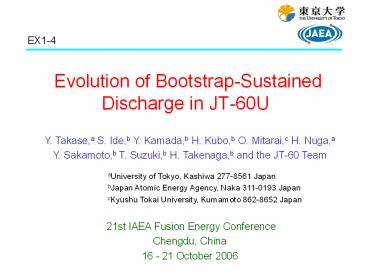Evolution of Bootstrap-Sustained Discharge in JT-60U PowerPoint PPT Presentation
Title: Evolution of Bootstrap-Sustained Discharge in JT-60U
1
Evolution of Bootstrap-Sustained Discharge in
JT-60U
EX1-4
Y. Takase,a S. Ide,b Y. Kamada,b H. Kubo,b O.
Mitarai,c H. Nuga,a Y. Sakamoto,b T. Suzuki,b H.
Takenaga,b and the JT-60 Team aUniversity of
Tokyo, Kashiwa 277-8561 Japan bJapan Atomic
Energy Agency, Naka 311-0193 Japan cKyushu
Tokai University, Kumamoto 862-8652 Japan 21st
IAEA Fusion Energy Conference Chengdu, China 16 -
21 October 2006
2
Outline
- Introduction
- Motivation and Objective
- Experimental Results
- Bootstrap-driven discharge (fBS 1)
- Evolution of self-sustained phase
- Comparison with high fBS discharge (fBS 0.9)
- Bootstrap overdrive (fBS gt 1)
- Conclusions
3
Motivations and Research Objectives
- External power required to drive the necessary Ip
has a large impact on the recirculating power
fraction, and therefore on the cost of
electricity. - Study characteristics and controllability of
plasmas with fBS 1 - If BS overdrive (fBS gt 1) could be achieved, this
may be used for Ip ramp-up. In this case
requirements for external current drive can be
reduced substantially. - Demonstration of BS overdrive
Fundamental impact on designs of ST reactors and
slim-CS tokamak reactors with limited central
solenoid (CS) capability.
4
JT-60U Coil System and Operational Scenarios
JT-60U Coil Configuration
- Surface loop voltage is given by
- Vl - Ml,OHIOH - ? Ml,PFIPF - LextIp
- 3 types of control scenarios
- constant Ip
- Lext dIp/dt 0
- constant OH coil current
- Ml,OH dIOH/dt 0
- constant surface flux
- Vl 0
co/ctr
Bt 3.7 - 4.0 T Ip 0.5 - 0.6 MA (q gt 10)
5
Power Balance for Ramp-up Experiment
- Poynting flux across the plasma surface is kept
at zero. - VlIp Pext dWmext/dt
- dWmint/dt Pel V2/RSp
Ip INI V/RSp INI ICD IBS Pext
VlextIp Pel VINI Wmext LextIp2/2
Wmint LintIp2/2 Wm Wmext Wmint
? ? ?E?jNIdV ?E?jOHdV
Overdrive power (INI gt Ip) Pel dWm/dt Pext
V2/RSp gt 0 for ramp-up For constant flux
control (VlIp 0) dWmint/dt Pel V2/RSp ?
Pel gt 0 for ramp-up Pext dWmext/dt gt
0 is supplied by the external circuit.
power balance for poloidal field magnetic energy
PNB
Pel
Ph
Pext
Wm
Wp
V2/RSp
Ploss
dWm/dt
dWp/dt
6
Fully Bootstrap-Driven Discharge
- Fully BS-driven plasma is realized
- Duration of self-sustained phase is limited by
slow confinement degradation (this case), or by b
collapses
7
Loop Voltage is Kept Nearly Zero for 0.2 s
MSE-based reconstruction Poloidal flux is
nearly constant for 0.2 s.
dIp/dt ? 0
dIp/dt lt 0
Vl 0 V
Iind -5kA
-30kA
Iind gt 0
INB -35kA
-33kA
8
Bootstrap-Sustained Discharge
Total current 543 kA (MSE) Inductive current
-5 kA (calculated from Vl profile) Beam driven
current -35 kA (calculated by OFMC/ACCOME) ?
Bootstrap current 583 kA (possibly slight
overdrive)
9
Examples of BS-Sustained Plasma
all with const. OH coil current
- Several discharges with fBS 100 were obtained
- E046293
- constant Ip maintained at 0.51MA for 1.3 s
noninductively - (BS negative NB)
Bv ramp-up
100 BS
10
Dynamics of BS-Driven Plasma
- Stored energy Wp increases and Ip increases to
610kA - ITB shrinks at b collapses, then recovers
partially - Ip is self-sustained (not driven by NBCD or OH
coil)
11
Evolutions of Ti and q Profiles
- ITB is eroded (becomes narrower) at b collapses,
and both Wp and Ip decrease.
- Spontaneous recovery of ITB, Wp, and Ip occurs.
- However, complete recovery to the original level
is not achieved.
2nd collapse
q
1st collapse
qmin radius
12
Stable Sustainment Aided by Co-NBI
- Steady sustainment achieved for over 2s with INB
40 kA (fBS 0.9) - Confinement is better with co-NBI (1.2 MJ / 5.9
MW vs. 1.0 MJ / 8.1 MW)
13
Evidence of Bootstrap Overdrive
- IAEA 2004 CS recharging with Vl lt 0 achieved
(const. Ip control) - Slow ramp-up at 10 kA/s for 0.5 s with zero
inductive flux input
14
Conclusions
- A fully bootstrap-driven discharge with fBS 1
was realized - Ip 510 kA was maintained for 1.3 s (with net
INB -35 kA). - Dynamics of BS-sustained plasma
- In discharges without a b collapse, slow
degradation of confinement resulted in slowly
declining Wp and Ip. - ITB shrinks radially at b collapses, resulting in
Wp and Ip decrease. Subsequently, partial
recovery of ITB and Ip occurs spontaneously. - Addition of positive INB (lt 10 of Ip) helps
steady sustainment of Ip greatly. - Evidence of bootstrap overdrive was observed
- Slow Ip rampup (10 kA/s for 0.5 s) was observed
with no inductive flux input.
Extension to higher Ip and a more complete
characterization of controllability of such a
plasma remain topics of further research.

